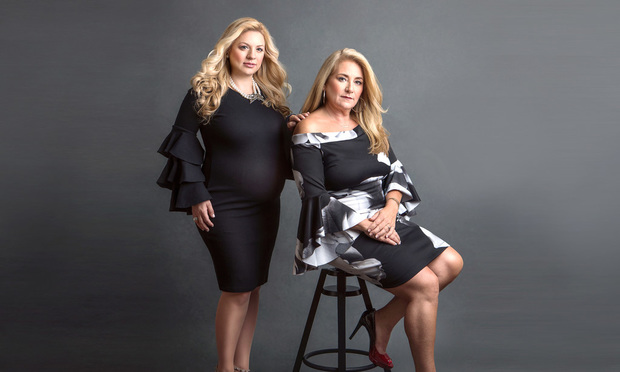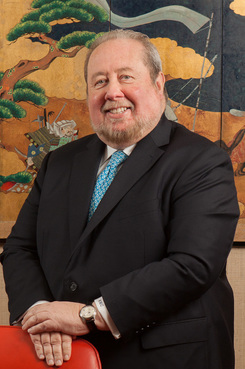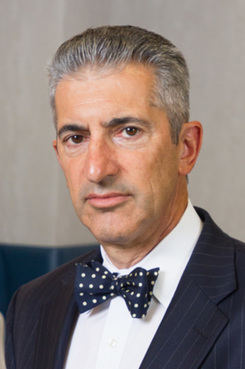Fashion Industry Practices 'in Season' for New Jersey Law Firms
News of Michael Kors buying out Versace, the continual downsizing of major department stores, and globalization with manufacturing shifting overseas resonate well beyond the fashion world and are opening up avenues for legal work.
November 27, 2019 at 09:00 AM
8 minute read
 Genova Burns of counsel Maria Fruci, left, and partner Kathleen Barnett Einhorn, right, are chairing the firm's new fashion law group. Courtesy photo
Genova Burns of counsel Maria Fruci, left, and partner Kathleen Barnett Einhorn, right, are chairing the firm's new fashion law group. Courtesy photo
News of Michael Kors buying out Versace, the continual downsizing of major department stores, and globalization with manufacturing shifting overseas resonate well beyond the fashion world and are opening up avenues for legal work.
Some notable firms have responded to an increased demand for services by creating a new niche practice focused on the fashion industry, such as Sills Cummis & Gross, or are considering the move, such as Pashman Stein Walder Hayden.
Genova Burns in Newark is the latest trendsetter. The firm announced on Nov. 12 that it was "leveraging the skills of some of its leading attorneys with its proximity to one of the world's primary fashion capitals, New York City," by launching a fashion law group.
The group is led by Kathleen Barnett Einhorn, a partner and chairwoman of the firm's commercial litigation department, and Maria Fruci, who became of counsel on July 1. It is to include at least eight firm attorneys and work with clients in areas such as labor and employment, intellectual property, licensing, franchising, copyright law, retail leasing and real estate, and counterfeit litigation, among others, according to the firm.
"It's kind of doing practice area work we have been doing for a long time, just more focused on the fashion industry and companies," Fruci said in a phone interview.
"Personally, being in the world we are in today, with a lot of startup fashion companies and because of social media and bloggers, the need for counsel and advice is much more important, and why fashion companies are turning to attorneys and law firms for that support so they are protected," she added.
"What applies to all businesses also applies to the fashion industry. At the end of the day, they are businesses looking to make money and protect themselves, and to be ahead of the game, whether it's a letter to a company because it may be infringing on its rights, or trying to resolve an issue without expending a lot of money," Fruci said.
There are an estimated 900 fashion companies headquartered in New York City, making New Jersey law firms attractive because of their proximity.
"Fashion is big business, employing 180,000 people in our region alone and generating $10.9 billion in total wages," Einhorn said in a statement. "With a growing industry that is constantly challenging and reinventing itself, the need for competent, qualified, and experienced legal counsel is increasing every day."
Einhorn, who also chairs the intellectual property practice at Genova Burns, refers to the new fashion law group—fittingly, it seems—as "one-stop shopping." It will fall under the commercial litigation practice.
"It's a creative field, a different industry, where you don't need five different law firms to do all the work. We are focusing in on that niche and offering full service," Einhorn said.
R. Max Crane, a managing partner at Sills Cummis, said his firm has been in the fashion law
 R. Max Crane, managing partner of Sills Cummis & Gross/courtesy photo
R. Max Crane, managing partner of Sills Cummis & Gross/courtesy photospace for about 20 years. Among its first clients were FILA Sports Apparel and Designer Holdings Ltd.
The firm became outside general counsel to FILA after the company underwent a reorganization and restructured its legal department, according to Crane. As general counsel, Sills Cummis did everything for FILA on the legal side, including acquisitions, dispositions, licensing, financings and litigation.
While the work isn't new, "It's gotten a little more complicated, and the business has gotten harder," Crane said in a phone interview. "Much of the manufacturing end of it has gone overseas. It's a complicated business involving licensing, merchandising and selling. You need a good lawyer to help you at almost every step of the way.
"With sourcing of manufacturing, there's tariffs, which change the basic economics of how you make money," Crane said. "It's a long line, and all along the way, someone is making money from it and someone has a legal issue with it.
"Everyone is trying to make sure they have goods they need for the season they need it, and now with actual, potential tariffs, they want to do it as quickly and efficiently as they can," Crane added.
In response to the changing retail world, in 2008 Sills Cummis expanded its New York fashion industry focus by bringing on someone who Crane described then and now as the premier fashion and apparel lawyer in the country: Michael Goldsmith. Goldsmith was joined by about a dozen attorneys in what had been his New York-based law office that focused almost exclusively on the fashion apparel industry.
"He's an extraordinary lawyer," Crane said. "The [fashion law] practice started in the Garment District of New York. It all originated out of that section of New York in the 30s and 40s between Eighth Avenue and Fifth Avenue, where Michael has been practicing for over 40 years."
The fashion, apparel and textile practice group became a specific department at Sills Cummis in 2009, with Goldsmith as chairman.
"He got a deeper bench, and a greater ability to service his clients and bring on new ones," Crane said.
Shrinking margins and intensifying competition in the fashion industry are why legal work is booming, Crane said, noting that "the back end of the business has moved overseas," and with that customs regulations, manufacturing contracts for supplies, output/input sourcing has become more complicated with additional regulations.
Most of Goldsmith's clients "are getting squeezed because manufacturing has changed, and now with e-commerce, there's been a shift in distribution because all the sales are happening on the e-commerce platform," Crane said. "It forced all the players to readjust and have e-commerce platforms and to deal with increasing regulatory schemes [overseas] which are different from the U.S."
Joseph D'Avanzo, a partner at Pashman Stein Walder Hayden in Hackensack, has been in the fashion law trenches for more than 18 years and knows firsthand just how complex the industry has become. He got his start being tapped as liaison counsel for the fashion model industry in an antitrust class action litigation. From there, with his extensive knowledge of the industry, he went on to represent fashion models and managers.
D'Avanzo said Pashman Stein is considering a separate fashion industry practice group, just like the firm's cannabis practice group.
 Joseph D'Avanzo of Pashman Stein Walder Hayden/courtesy photo
Joseph D'Avanzo of Pashman Stein Walder Hayden/courtesy photo"We're considering turning our current work in the fashion industry into a fashion law practice to better highlight the experience we have in that industry," D'Avanzo said. "Law firms are now opening these fashion industry practice groups, whereas before there were only a handful of attorneys handling fashion law generically.
"It's now a nearly $11 billion industry, and I think law firms are sort of waking to the fact that this industry has a lot of needs where creating a practice group for the industry makes a lot of sense," D'Avanzo added.
"For instance, you have labor-employment issues that have arisen, where fashion models are claiming they have been misclassified as independent contractors and should instead be classified as employees of fashion model agencies," he said.
There is a current class action suit pending in New York, in which D'Avanzo is involved as counsel, where models are trying to change the conditions under which they work, he said. D'Avanzo is representing one of the defendant fashion modeling agencies, which he declined to name.
"There are accusations of price fixing by the agencies, and the question is, are fashion model agencies unlicensed or licensed employment agencies? The models claim the agencies extend usage of their images without their consent for commissions," D'Avanzo said of the litigation.
"What you are seeing is an evolutionary change in the fashion model industry. It's not just the litigation, but also, you have changes in regulations. … Regulatory work, labor-employment work, transactional work, negotiating contracts with models and their modeling manager or celebrities and customers, licensing work, restrictive covenants with non-competes, intellectual property rights—it's all growing as the internet expands," D'Avanzo said.
Crane gave a similar forecast.
"In fashion, whether you are selling a brand or handbag, it now involves its own regulatory regime as to what you have to disclose on your e-commerce website and what information you can ask your actual customer," he said.
"Every e-commerce privacy issue in any financial interaction, Facebook posting or Google search touches in some way on the fashion and apparel business in terms of its e-commerce trade," Crane said. "It has a derivative piece to it that implicates the fashion industry.
"That's a moving target right now," he said. "It's more complicated now than it ever used to be."
This content has been archived. It is available through our partners, LexisNexis® and Bloomberg Law.
To view this content, please continue to their sites.
Not a Lexis Subscriber?
Subscribe Now
Not a Bloomberg Law Subscriber?
Subscribe Now
NOT FOR REPRINT
© 2025 ALM Global, LLC, All Rights Reserved. Request academic re-use from www.copyright.com. All other uses, submit a request to [email protected]. For more information visit Asset & Logo Licensing.
You Might Like
View All
Send Us Your New Partners for the NJ Law Journal's New Partners Yearbook
1 minute read
New Methods for Clients and Families to Have Their Estate and Legacy Planning Complete
5 minute read
Tensions Run High at Final Hearing Before Manhattan Congestion Pricing Takes Effect
4 minute readLaw Firms Mentioned
Trending Stories
- 1SDNY US Attorney Damian Williams Lands at Paul Weiss
- 2Litigators of the Week: A Knockout Blow to Latest FCC Net Neutrality Rules After ‘Loper Bright’
- 3Litigator of the Week Runners-Up and Shout-Outs
- 4Norton Rose Sues South Africa Government Over Ethnicity Score System
- 5KMPG Wants to Provide Legal Services in the US. Now All Eyes Are on Their Big Four Peers
Who Got The Work
Michael G. Bongiorno, Andrew Scott Dulberg and Elizabeth E. Driscoll from Wilmer Cutler Pickering Hale and Dorr have stepped in to represent Symbotic Inc., an A.I.-enabled technology platform that focuses on increasing supply chain efficiency, and other defendants in a pending shareholder derivative lawsuit. The case, filed Oct. 2 in Massachusetts District Court by the Brown Law Firm on behalf of Stephen Austen, accuses certain officers and directors of misleading investors in regard to Symbotic's potential for margin growth by failing to disclose that the company was not equipped to timely deploy its systems or manage expenses through project delays. The case, assigned to U.S. District Judge Nathaniel M. Gorton, is 1:24-cv-12522, Austen v. Cohen et al.
Who Got The Work
Edmund Polubinski and Marie Killmond of Davis Polk & Wardwell have entered appearances for data platform software development company MongoDB and other defendants in a pending shareholder derivative lawsuit. The action, filed Oct. 7 in New York Southern District Court by the Brown Law Firm, accuses the company's directors and/or officers of falsely expressing confidence in the company’s restructuring of its sales incentive plan and downplaying the severity of decreases in its upfront commitments. The case is 1:24-cv-07594, Roy v. Ittycheria et al.
Who Got The Work
Amy O. Bruchs and Kurt F. Ellison of Michael Best & Friedrich have entered appearances for Epic Systems Corp. in a pending employment discrimination lawsuit. The suit was filed Sept. 7 in Wisconsin Western District Court by Levine Eisberner LLC and Siri & Glimstad on behalf of a project manager who claims that he was wrongfully terminated after applying for a religious exemption to the defendant's COVID-19 vaccine mandate. The case, assigned to U.S. Magistrate Judge Anita Marie Boor, is 3:24-cv-00630, Secker, Nathan v. Epic Systems Corporation.
Who Got The Work
David X. Sullivan, Thomas J. Finn and Gregory A. Hall from McCarter & English have entered appearances for Sunrun Installation Services in a pending civil rights lawsuit. The complaint was filed Sept. 4 in Connecticut District Court by attorney Robert M. Berke on behalf of former employee George Edward Steins, who was arrested and charged with employing an unregistered home improvement salesperson. The complaint alleges that had Sunrun informed the Connecticut Department of Consumer Protection that the plaintiff's employment had ended in 2017 and that he no longer held Sunrun's home improvement contractor license, he would not have been hit with charges, which were dismissed in May 2024. The case, assigned to U.S. District Judge Jeffrey A. Meyer, is 3:24-cv-01423, Steins v. Sunrun, Inc. et al.
Who Got The Work
Greenberg Traurig shareholder Joshua L. Raskin has entered an appearance for boohoo.com UK Ltd. in a pending patent infringement lawsuit. The suit, filed Sept. 3 in Texas Eastern District Court by Rozier Hardt McDonough on behalf of Alto Dynamics, asserts five patents related to an online shopping platform. The case, assigned to U.S. District Judge Rodney Gilstrap, is 2:24-cv-00719, Alto Dynamics, LLC v. boohoo.com UK Limited.
Featured Firms
Law Offices of Gary Martin Hays & Associates, P.C.
(470) 294-1674
Law Offices of Mark E. Salomone
(857) 444-6468
Smith & Hassler
(713) 739-1250







